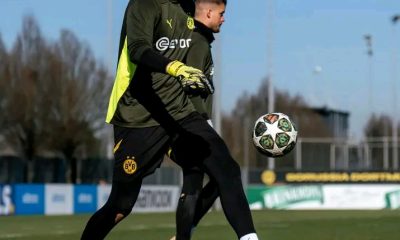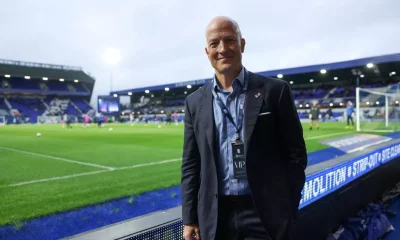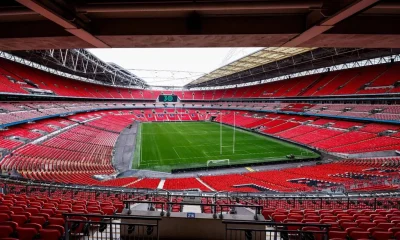Sport
Birmingham City Fc Has Given Their Final Verdict On A Historical Match “Clash” That…
Birmingham City Fc Has Given Their Final Verdict On A Historical Match “Clash” That…
Saturday 4th January 1969
Birmingham City 2 Lincoln City 1 (FA Cup Third Round)
After the grim days of the early and mid-1960s Lincoln City had revived under manager Ron Gray to finish mid-table in the previous season and spent the first month of the current one on top of the Fourth Division, write Malcolm Johnson.
They had slipped slightly since then but had mostly been in and around the promotion places and were currently third despite narrowly losing to Port Vale in front of a Boxing Day crowd of over 12,000 at Sincil Bank. The run to the third round of the FA Cup for the first time in four years had started with a professional performance in a 3-1 away win against top non-league side Macclesfield Town which was followed by a memorable second round replay victory against fellow Fourth Division side Chester. After a one-all draw at Sealand Road a dramatic game at Sincil Bank saw the Imps win 2-1 despite goalkeeper John Kennedy dislocating his elbow just before half time. With defender Jim Grummett taking over in goal City were down to ten men having earlier brought on substitute Jack Lewis when Peter Kearns had limped off injured, but a Dave Smith goal after 80 minutes sealed a battling performance.
Birmingham City, after a ten-year spell in the First Division ended with relegation in 1965 had finished fourth in the second tier in the previous season under the management of legendary former Wolves boss Stan Cullis. They had also reached the semi-finals of the FA Cup, losing to local rivals West Bromwich Albion. They had not been doing so well in the current season, however, and were currently in 17th place.
The teams were:
City:
1. Jack McClelland
2. Phil Hubbard
3. George Peden
4. Jim Smith
5. Ray Harford
6. Jim Grummett
7. Gordon Hughes
8. Peter Kearns
9. Norman Corner
10. Bobby Svarc
11. Dave Smith
12. Jack Lewis
Birmingham:
1. Jim Herriot
2. Ray Martin
3. Colin Green
4. Ron Wylie
5. Dave Robinson
6. Malcolm Page
7. Trevor Hockey
8. Jimmy Greenhoff
9. Fred Pickering
10. Mick Darrell
11. Phil Summerill
12. Malcolm Beard
Former Arsenal and Northern Ireland international Jack McClelland was playing his second game for the Imps having been signed on loan from Fulham following Kennedy’s injury. The 28-year-old had been capped six times for his country and played around one hundred games in the top two divisions. He was the first player to join City on loan under the modern system introduced the previous season.
Right back was the versatile and home-grown Phil Hubbard in what his manager possibly considered his best position. The 19-year-old had recently come into the side in the absence of Graham Taylor, injured in the first game against Chester. Hubbard was partnered by the reliable George Peden who had not missed a game since joining from Hearts towards the very end of the 1966/67 season. Central defenders were the now established partnership of Ray Harford and Jim Grummett. Harford, still only 23, had started his career with a handful of appearances for Charlton Athletic before a season and a half at Exeter from whom City had signed him on a free transfer in the summer of 1967. Grummett, son of a former City player of the same name, like Hubbard had been developed by the club and was almost as versatile, playing in every position at one time or other, including half a game in goal in the Chester replay. But there was no doubt that alongside the centre half was his best position although he had appeared effectively as a striker from time to time.
The two midfielders in City’s 4-2-4 formation included 28-year-old Jim Smith, a solid lower division player with plenty of experience at Aldershot and Halifax before joining City for a fee of £1,000 as part of Ron Gray’s mid-season rebuilding the previous March. Like Ray Harford and the absent Graham Taylor, he was to go on to have a notable career in management including a spell in charge of today’s opponents. With Jack Lewis who had started the season in midfield currently out of favour there had been one or two changes in that department and for this game Peter Kearns, who had lost his place as a striker after just six goals in the season so far came into the side alongside Smith. The 31-year-old had been another player to join the previous March arriving on a free transfer from Aldershot where he had averaged a goal every three games following earlier experience with Plymouth.
On the right wing was the still-speedy 32-year-old Gordon Hughes, the third player to be signed the previous March at a cost of £6,000 from Derby County. He had made well over 300 appearances in the top two divisions for the Rams and previous club Newcastle United. On left was Dave Smith who had joined from Middlesbrough reserves in the summer and was to become a club legend, standing third in the list of players with most appearances for City and narrowly failing to win promotion with City under David Herd in 1972 before doing so as part of Graham Taylor’s record-breaking side four years later.
Centre forward for City was the tall and robust Norman Corner who had joined from Hull City’s reserves in the autumn of the previous season for £1,000. Initially seen as something of a failure he had come good later in the season, finishing with a run of 7 goals in 10 games. However, like Kearns, he had not done as well in the current season with just five to his name so far. Because of the lack of goals from the two main strikers Ron Gray had acted to remedy the situation with the signing a month before of Leicester City reserve Bobby Svarc for £6,000. He had made a low-key start to his City career, signed too late to play in the two cup games with Chester he had made his debut in a game at York before scoring against Bradford City in a 2-0 win at Sincil Bank.
City substitute was the mercurial Jack Lewis, signed as an 18-year-old from Midland League Long Eaton United in March 1967 but despite his attacking flair and occasional spectacular goals never seeming to hold a place in the side for very long.












